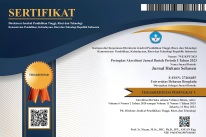The Existence Of Customary Law In Domestic Violence Mediation: Harmonization Between State Law And Customary Law
Abstract
This study aims to examine the role of customary law in mediating domestic violence (DV) cases and how harmonization between customary law and state law can be realized. In several indigenous communities in Indonesia, dispute resolution, including cases of domestic violence, still relies on customary mechanisms that are collective and based on deliberation. However, this often conflicts with state law which has strict rules regarding criminal acts of domestic violence. The research method used is a juridical-empirical approach with case studies in several indigenous communities in Central Aceh. The results of the study show that customary law has a strong existence in handling cases of domestic violence through mediation, where perpetrators and victims are invited to reconcile by involving customary elders. However, there are still challenges in harmonization between customary law and state law, especially in terms of implementing sanctions and protecting victims. This study concludes that harmonization between customary law and state law is needed to create comprehensive justice, where customary law can be recognized as an effective dispute resolution mechanism, but remains in line with the principles of state legal protection for victims of domestic violence. To achieve this, regulatory and policy efforts are needed that are able to integrate the two legal systems proportionally.
Downloads
Copyright (c) 2024 Irma Fatmawati; Rahul Ardian Fikri, Mhd Azhali Siregar, Nabilah Syaharani

This work is licensed under a Creative Commons Attribution-ShareAlike 4.0 International License.






